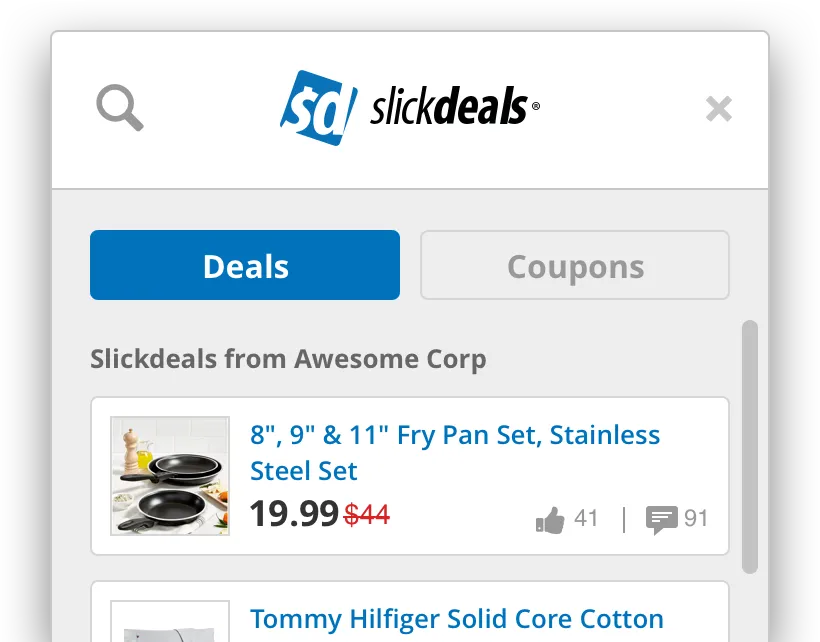Browser Extension vs Mobile App: Which Saves More Money?
A detailed comparison of grocery coupon browser extensions versus mobile apps. Find out which method delivers better savings and convenience for smart shoppers.


Browser Extension vs Mobile App: Which Saves More Money?
Published December 16, 2024 | Last Updated: December 16, 2024
When it comes to saving money on groceries in the Chicago area, shoppers today have more digital tools than ever. The two most popular options are browser extensions and mobile apps, each offering unique advantages for coupon clipping and deal hunting at local stores like Jewel-Osco, Mariano's, and Target throughout Illinois.
But which approach actually saves you more money when shopping at Chicago-area grocery stores? Let's dive deep into this comparison to help Illinois families make the best choice for their shopping habits and local grocery chains.
This guide builds on our comprehensive reviews of grocery coupon apps and advanced coupon stacking strategies to give you the complete picture.
Browser Extensions: The Desktop Powerhouse
Browser extensions are small software programs that integrate directly with your web browser, automatically applying coupons and finding deals as you shop online.
Top Browser Extensions for Grocery Savings
1. Jewel-Osco Coupon Clipper
- Automatically clips all available Jewel-Osco digital coupons
- Works on Chrome and Firefox
- Zero setup required
- Average savings: $30-50 per shopping trip
2. Honey
- Finds and applies promo codes at checkout
- Works with grocery pickup and delivery services
- Cashback rewards program
- Average savings: $5-25 per online order
3. Capital One Shopping
- Price comparison across retailers
- Automatic coupon application
- Cashback on grocery delivery
- Average savings: $10-30 per month
Advantages of Browser Extensions
Automation: Extensions work in the background, requiring minimal effort from users. They automatically find and apply coupons without you having to remember to open an app.
Speed: Instant coupon application during online shopping. No need to manually search for or input coupon codes.
Desktop Shopping: Perfect for shoppers who prefer planning meals and ordering groceries from their computer.
No Storage Issues: Extensions take up minimal device storage compared to apps.
Disadvantages of Browser Extensions
Limited Mobile Use: Most extensions don't work on mobile browsers, limiting their usefulness for in-store shopping.
Browser Specific: Need to install separately on each browser you use.
Online Only: Only work for online grocery shopping, not beneficial for in-store purchases.
Mobile Apps: The On-the-Go Solution
Mobile apps provide comprehensive coupon and savings tools directly on your smartphone, making them perfect for in-store shopping and meal planning on the go.
Top Mobile Apps for Grocery Savings
1. Ibotta
- Receipt scanning for cash back
- In-store barcode scanning
- Team challenges for bonus rewards
- Average savings: $10-30 per month
2. Checkout 51
- Weekly cash back offers
- Receipt scanning
- Bonus challenges
- Average savings: $5-15 per week
3. Store-Specific Apps (Kroger, Target, Walmart)
- Digital coupon clipping
- Personalized offers
- Store loyalty program integration
- Average savings: 15-25% per shopping trip
Advantages of Mobile Apps
In-Store Functionality: Apps work perfectly for in-store shopping, allowing you to scan barcodes and access digital coupons while physically shopping.
Receipt Scanning: Many apps offer cash back through receipt scanning, which extensions cannot provide.
Personalization: Apps can track your shopping habits and provide personalized offers based on your preferences.
Comprehensive Features: Often include shopping lists, price comparison, and loyalty program integration.
Always Available: Your phone is always with you, making it easy to check deals while shopping.
Disadvantages of Mobile Apps
Battery Drain: Multiple coupon apps can drain your phone's battery quickly.
Storage Space: Apps take up valuable storage space on your device.
Manual Work: Requires more active participation – you need to remember to open the app, scan receipts, and clip coupons.
App Overload: Using multiple apps can become overwhelming and time-consuming.
Head-to-Head Comparison
Savings Potential
Browser Extensions Winner: Automation
- Jewel-Osco Coupon Clipper: $30-50 per trip (automatic)
- Honey: $5-25 per online order (automatic)
- Capital One Shopping: $10-30 per month (automatic)
Mobile Apps Winner: Comprehensive Coverage
- Ibotta: $10-30 per month (receipt scanning)
- Store apps: 15-25% per trip (digital coupons)
- Checkout 51: $5-15 per week (cash back offers)
Verdict: Browser extensions often provide higher per-transaction savings due to automatic coupon stacking, while mobile apps provide more consistent, smaller savings across all shopping methods.
Ease of Use
Browser Extensions:
- Setup: Very easy (one-click install)
- Daily use: Completely automatic
- Learning curve: None
Mobile Apps:
- Setup: Easy to moderate (account creation, linking cards)
- Daily use: Requires active participation
- Learning curve: Moderate (understanding each app's features)
Winner: Browser Extensions for pure ease of use
Versatility
Browser Extensions:
- Work for online shopping only
- Limited to desktop/laptop computers
- Great for grocery pickup and delivery orders
Mobile Apps:
- Work for both in-store and online shopping
- Available anywhere you take your phone
- Provide additional features like price comparison and shopping lists
Winner: Mobile Apps for versatility
Time Investment
Browser Extensions:
- Setup time: 2-3 minutes total
- Ongoing time: 0 minutes (completely automatic)
- Monthly time investment: Under 5 minutes
Mobile Apps:
- Setup time: 10-15 minutes per app
- Ongoing time: 5-10 minutes per shopping trip
- Monthly time investment: 2-4 hours
Winner: Browser Extensions for time efficiency
The Hybrid Approach: Best of Both Worlds
Smart shoppers are increasingly using both browser extensions AND mobile apps to maximize their savings. Here's how to combine them effectively:
For Online Shopping:
- Use browser extensions for automatic coupon application
- Check mobile apps for additional cash back offers
- Compare prices using both tools before making purchases
For In-Store Shopping:
- Plan with mobile apps before leaving home
- Use store apps for digital coupon clipping
- Scan receipts with cash back apps after shopping
Weekly Routine:
- Sunday: Plan weekly meals and check apps for new offers
- Tuesday: Clip digital coupons using browser extension and apps
- Shopping day: Use mobile apps in-store, browser extensions for any online orders
- After shopping: Scan receipts for cash back
Real-World Case Studies
Case Study 1: Extension-Only User
Profile: Sarah, busy professional who orders groceries online Tools: Jewel-Osco Coupon Clipper + Honey Monthly savings: $120-150 Time investment: 5 minutes per month Shopping method: 100% online grocery pickup
Case Study 2: App-Only User
Profile: Maria, stay-at-home mom who shops in-store with kids Tools: Ibotta + Target app + Kroger app Monthly savings: $80-110 Time investment: 3-4 hours per month Shopping method: 100% in-store shopping
Case Study 3: Hybrid User
Profile: David, tech-savvy shopper who uses both methods Tools: Browser extensions + multiple mobile apps Monthly savings: $180-220 Time investment: 2-3 hours per month Shopping method: 60% in-store, 40% online
Which Method Saves More Money?
The answer depends on your shopping habits and lifestyle:
Choose Browser Extensions If:
- You primarily shop online for groceries
- You want maximum savings with minimal effort
- You shop mainly at stores with browser extension support (like Jewel-Osco)
- You value automation over versatility
Choose Mobile Apps If:
- You prefer shopping in physical stores
- You shop at multiple different grocery chains
- You don't mind spending time actively couponing
- You want comprehensive savings across all purchase types
Choose Both If:
- You want to maximize your total savings
- You shop both online and in-store
- You're willing to invest time in learning multiple tools
- You enjoy the process of finding deals and saving money
Tips for Success
For Browser Extension Users:
- Install on all browsers you use for shopping
- Check extension permissions regularly for security
- Combine with store loyalty programs for additional savings
- Use price comparison extensions alongside coupon extensions
For Mobile App Users:
- Limit yourself to 3-4 apps to avoid overwhelm
- Set up notifications for new offers and deals
- Organize apps in folders for easy access while shopping
- Regularly clear cache to keep apps running smoothly
For Hybrid Users:
- Create a weekly routine that incorporates both methods
- Track savings separately to see which method works best for you
- Stay organized with a simple system for managing multiple tools
- Focus on stores and brands you actually shop at regularly
Future of Grocery Savings Technology
The line between browser extensions and mobile apps is blurring as technology evolves:
Progressive Web Apps (PWAs): Combining the best features of both extensions and apps AI-Powered Recommendations: Smarter, more personalized savings suggestions Integrated Loyalty Programs: Seamless connection between store programs and savings tools Voice-Activated Couponing: Hands-free coupon clipping and deal finding
Chicago-Area Recommendations
Best Combinations for Local Stores:
For Jewel-Osco Shoppers:
- Browser Extension: Jewel-Osco Coupon Clipper for automatic digital coupon clipping
- Mobile App: Jewel-Osco app for in-store Just4U offers and gas rewards
For Mariano's (Kroger) Shoppers:
- Browser Extension: Honey for online pickup orders
- Mobile App: Kroger app for personalized deals and fuel points
For Target Shoppers:
- Browser Extension: Capital One Shopping for price comparisons
- Mobile App: Target Circle for RedCard savings and exclusive offers
Chicago Shopping Patterns:
Most Chicago-area shoppers find browser extensions work best for:
- Weekly meal planning sessions
- Online grocery pickup orders
- Late-night shopping from home
Mobile apps excel for:
- In-store shopping at suburban locations
- Quick trips during lunch breaks in the Loop
- Receipt scanning while commuting on the CTA
Related Money-Saving Resources
Continue your savings journey with these complementary guides:
- Best Grocery Coupon Apps for Chicago Families - Comprehensive app reviews for local stores
- Master Jewel-Osco Coupon Stacking - Advanced strategies for maximum savings
Conclusion
Both browser extensions and mobile apps can significantly reduce your grocery bills for Chicago-area families, but they excel in different areas. Browser extensions like the Jewel-Osco Coupon Clipper offer unbeatable automation and ease of use for online shopping, while mobile apps provide comprehensive in-store functionality and versatile savings opportunities at local grocery chains.
For maximum savings at Illinois grocery stores, consider using both: browser extensions for effortless online savings, and mobile apps for in-store shopping and receipt-based cash back. The key is finding the right balance for your shopping habits and the local stores you frequent in the Chicago metro area.
Remember, the best savings tool is the one you'll actually use consistently while shopping at your neighborhood Jewel-Osco, Mariano's, or other local grocery stores. Start with one approach, master it, and then consider adding additional tools to boost your family's savings even further throughout the Chicago area.